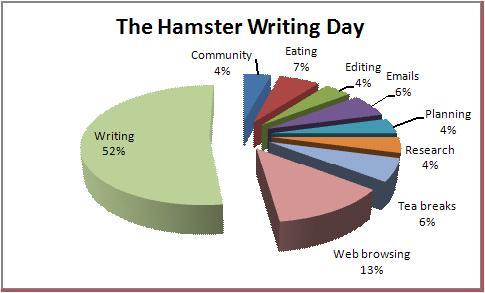What Do You Do All Day… Now?
 A budding writer recently contacted me via my website, asking about the practicalities of putting pen to paper, and being a freelance author. I thought it would be useful to share my response on the blog for others to see.
A budding writer recently contacted me via my website, asking about the practicalities of putting pen to paper, and being a freelance author. I thought it would be useful to share my response on the blog for others to see.
Hi Gav
If you have the time, I would like to ask you a few questions regarding your success in the industry. You produce an impressive amount of content very quickly; I feel like every time I turn around, Gav Thorpe’s name is emblazoned across the bottom of another novel. Just off the top of my head, you have penned Lorgar: Bearer of the Word, Ghost Warrior; the Hand of Darkness and Eye of Night audio dramas and Jain Zar. Those were all released just this year! My questions, then, are these:
What goals do you set for yourself when producing a commission?
What timeline do you try to adhere to (research, novel structuring, writing, rewriting, editing, etc)?
Do you try to achieve a certain word count everyday?
What percentage of the day do you spend interacting with your fanbase on social media?
(For personal edification, not prying) You say you produce as much as you do to pay your mortgage. You have over 130 products over the past twenty years. With the royalties from those, how do you even still HAVE a mortgage?
Last of all, would you say that working as a full-time freelancer has been worth it, both financially speaking and in terms of personal fulfillment?
If you have the time to answer any of these questions, I would be overwhelmed by your generosity. Thank you, sir. Have a wonderful day!
Hi Jon
They are tricky questions to answer, as my process and productivity has changed over the years as I’ve gained more experience and understood my own writing style better. That said, I’ll give it a go.
Thorpe Central – Hamster not necessary to becoming an author.
My current aim is to type 2,000 words a day, four days a week, which works out at 10 weeks to finish an 80,000 word novel. I add a week at the beginning for fleshing out the synopsis into a chapter and scene plan on Scrivener, and a week at the end to read through and edit. I get another chance to edit when the edits come back from Black Library, but hopefully at that stage there won’t be any significant changes I want to make. You’ll note that I’ve used the word ‘type’ specifically to refer to the time putting the story down on paper (keyboard). The process of coming up with the story happens over a longer period of time from initial idea pitch, through synopsis, and then daily as I’m actually ‘typing’ the novel.All of the above are the goals I set myself, but there hasn’t yet been a project that works out that neatly. At any one time I’m usually working on 3-6 projects (writing fiction, video games consultancy, games design etc) so depending on deadlines I might end up having to write more words a day, and writing on evenings and weekends. There are also endless reasons a project can get behind too – illness, family emergencies, the Rugby World Cup to name just a few. Usually by the end of a project I have to write 3-4,000 words a day to meet the deadline. I’m a fast writer so there have been times when I’ve written upwards of 6,000 words a day.
I wouldn’t aim to match these timescales yet however, they are derived from over 20 years of writing, about topics that I’ve lived with and written about for a long time. It’s also very different to when I started out – back then I was writing in my spare time, while working full-time for Games Workshop. Back in 2010 I wrote a blog post called “What Do You Do All Day“, which will give you more of an insight into my (then) typical day.
A typical writing day (originally created in 2010)
The time spent on social media is a difficult one to judge. I have a blog, newsletter, Facebook, Twitter and Instagram accounts. I also receive a fair bit of email from fans, and contacts via the website. The reason I only plan to write four days a week is that the fifth day is spent doing all this associated admin. I’m probably on Social Media for about an hour over the course of each day, but that’s fairly easy to do when I’m waiting for the kettle to boil etc.
There are other work related things that take up my time too. This week I’ve got three podcasts, a book signing, and a written interview to respond to. It’s typically only this busy around the release of a new book (Ghost Warrior at the moment), but as you mention in your question – that happens quite frequently for me! Have a look at the Interviews section of my website to get an idea of how many I do.
Biggest benefit of being a freelancer – spending time with Sammy
Working as a full-time freelancer has definitely been worth it in terms of my personal fulfillment. My work life balance is great – I get to choose my own hours, don’t have a daily commute, and am now at a stage where I can pick and choose projects that appeal to me, rather than just having to take anything that pays. The biggest benefit however is the quality time I can spend with my son and partner.If you want to become a writer for the millions it will earn you, you might want to rethink your career path; it’s one of the reasons I also have to work on video and tabletop games (actually, the tabletop games work is more for the love of it – you don’t see many games designers driving Ferraris). There are a very small number of authors who reach the big time – people like JK Rowling who are now household names and can, I presume, command good royalties for their work. There’s a great blog post from Kameron Hurley that will give you some stark figures about book sales and royalties. Hopefully that will explain why I still have a mortgage to pay off…
I hope that has been useful for those considering a career as a writer. I’ll add again that it has taken me 20 years to get to this stage, and my process is still evolving, so don’t expect to find your perfect routine straight away.
If you want another view of a writer’s life, and to love Aaron Dembski-Bowden just a little bit more, check out part one and part two of his ‘Day in the Life’ blogs.
As always, if you have any writing related questions, leave a comment below.
YOU MAY ALSO LIKE:
‘Things I Always Do’ writing tips
Planning your workload, and what to do when it goes wrong
Why you should ignore all my advice…
**To make sure you don’t miss out on any blog posts, you can keep up-to-date with everything Gav by signing up to my monthly newsletter. As a bonus, every other month I randomly pick a newsletter subscriber to receive a free signed copy of one of my books.**
Please Feel Free to Share:







 newest »
newest »








I have been privileged over the last few years to meet you at BL events, and discuss your books and listen to you talk about your books. But I have to say, the most insight I get about being a writer comes from your blogs. You are an inspiration to aspiring writers, thank you and long may you continue.